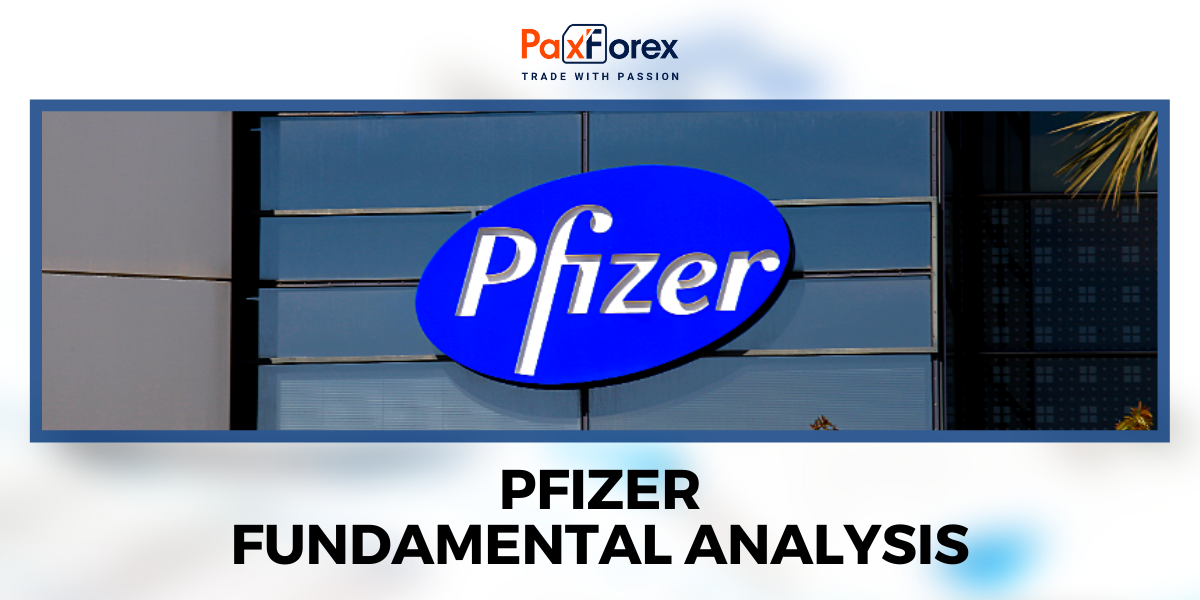
Source: PaxForex Premium Analytics Portal, Fundamental Insight
Pfizer, a pharmaceutical giant, boasts a diverse portfolio of medications spanning various therapeutic areas, including autoimmune diseases and oncology. Nevertheless, its most notable achievement in recent times has been the development of a leading coronavirus vaccine, which propelled the company to a historic milestone of over $100 billion in annual revenue last year. However, despite this stellar financial performance, Pfizer's stock has experienced a notable decline of approximately 35% this year.
So, why has the share price dipped despite the robust revenue? Investors are expressing concerns regarding Pfizer's vaccine sales in a post-pandemic world, particularly as vaccine demand has begun to wane. Additionally, the company is grappling with the looming patent expirations of other crucial products, leading to potential revenue losses. Nevertheless, Pfizer is not resting on its laurels and may be undergoing a transition into a new phase of growth. The question remains: Is Pfizer's stock a worthwhile investment at this juncture?
Let's first assess the risks both today and on the horizon. Pfizer currently markets the COVID-19 vaccine Comirnaty and COVID treatment Paxlovid, both of which are experiencing declining demand. Pfizer anticipates approximately $13.5 billion in Comirnaty revenue and $8 billion in Paxlovid revenue this year, reflecting double-digit declines compared to the previous year.
These projections are based not only on secured government contracts but also on the expectation of sales in the commercial market, involving direct sales to healthcare providers. Governments are shifting away from large-scale vaccine purchases, meaning vaccine manufacturers may increasingly rely on pharmacies, healthcare entities, and other commercial purchasers. This transition introduces some risk, as these customers typically do not commit to extensive supply agreements years in advance, as governments have done.
Furthermore, Pfizer faces the loss of exclusive rights to some of its other blockbuster drugs over the coming decade, including the blood thinner Eliquis and cancer medication Ibrance. Pfizer has stated that impending patent expirations could result in revenue losses totaling $17 billion from 2025 through 2030.
Considering all the factors at play, it's not surprising that some investors have hesitated to buy Pfizer shares. However, it's crucial to weigh the positive developments against the negative aspects.
Let's begin with Pfizer's coronavirus-related products. While it's unlikely that sales will reach the levels seen during the peak of the pandemic, Comirnaty and Paxlovid could still become a reliable source of steady, albeit lower, recurring revenue. Pfizer, along with rival Moderna, has suggested that the coronavirus market might evolve similarly to the flu shot market, with about half of Americans opting for annual vaccines. This could potentially translate into substantial billion-dollar revenue for Pfizer, particularly given its market leadership with a 65% share in the first six months of this year.
Earnings derived from its vaccine and coronavirus treatment have also empowered Pfizer to fund additional initiatives and acquisitions, which should fuel its long-term growth. Notably, Pfizer acquired four companies last year—Arena Pharmaceuticals, ReViral, Biohaven, and Global Blood Therapeutics—that are expected to contribute more than $10 billion to revenue by 2030. Furthermore, if Pfizer successfully completes its planned acquisition of oncology specialist Seagen, an additional $10 billion in revenue is on the horizon.
This leads us to addressing the challenge posed by the impending patent cliff. While these acquisitions have the potential to mitigate revenue losses, Pfizer is not relying solely on them. The company anticipates generating $20 billion in revenue by 2030 from new product launches that are currently underway. Pfizer is approximately halfway through its most significant wave of product releases, aiming for 19 launches in an 18-month period. These contributions are expected to begin materializing in the second half of this year.
In fact, Pfizer projects that business deals, ongoing product launches, and potential future launches from its internal pipeline could result in a total non-coronavirus revenue of up to $84 billion in 2030.
Considering these factors, is Pfizer a worthy investment right now? In my assessment, the positive aspects mentioned above outweigh the negatives. Pfizer appears well-prepared to compensate for potential lost revenue and foster growth in the years to come. The revenue outlook for 2030 appears promising, even without factoring in coronavirus product sales. Additionally, coronavirus vaccine sales could provide a stable recurring component to the overall picture. Furthermore, Pfizer's shares are currently trading at around 10 times forward earnings estimates, which appears exceptionally affordable given the circumstances. Consequently, Pfizer seems like a prudent investment at this juncture, even as the company undergoes a transitional phase. While immediate stock price gains may not be expected, investors entering at the current price point may enjoy dividends in the near term, as Pfizer has expressed its commitment to rewarding shareholders, along with the potential for improved share price performance in the future.
As long as the price is below 36.00, follow the recommendations below:
- Time frame: D1
- Recommendation: short position
- Entry point: 33.23
- Take Profit 1: 32.00
- Take Profit 2: 29.00
Alternative scenario:
If the level of 36.00 is broken-out, follow the recommendations below:
- Time frame: D1
- Recommendation: short position
- Entry point: 36.00
- Take Profit 1: 37.00
- Take Profit 2: 30.00













